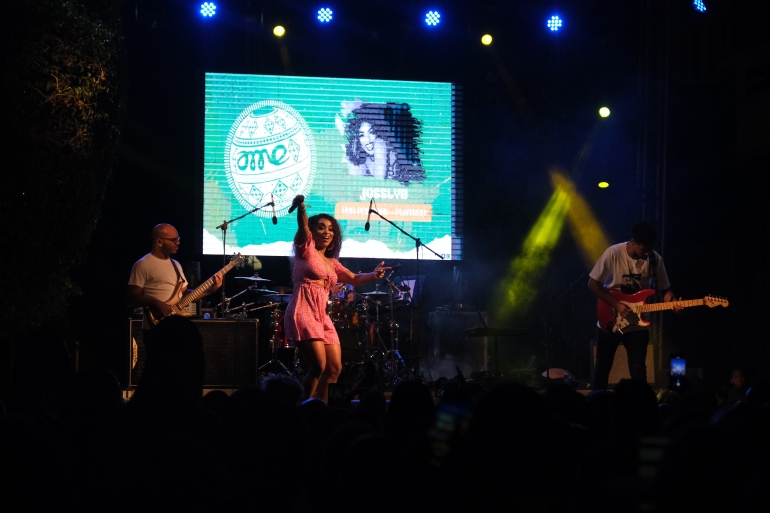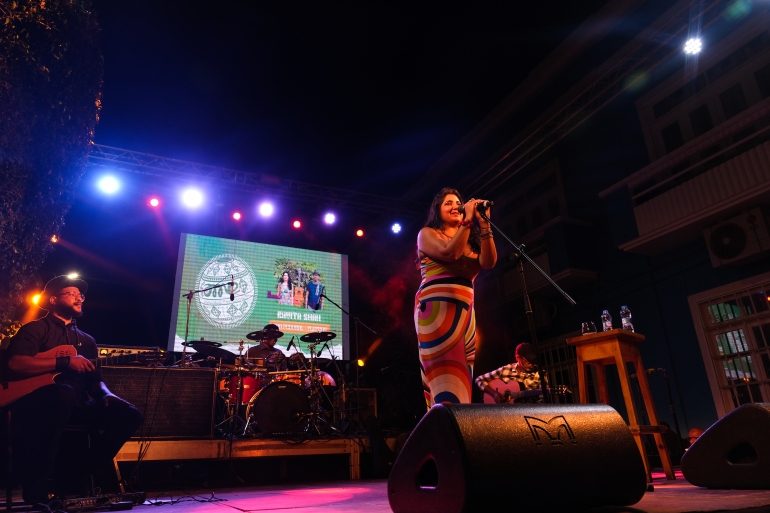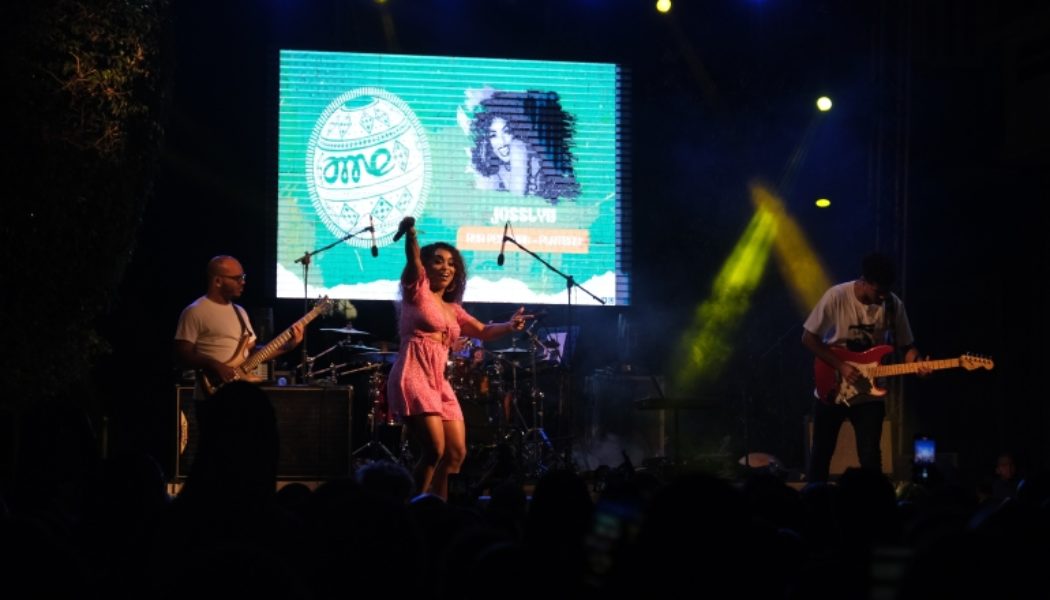Praia, Cape Verde – Across the island town of Praia, capital of Cape Verde and one of its 10 constituent islands, the cool Atlantic breeze blows through, as a reminder of the nature of coming and going – a common theme of morna, a genre that gained international fame from the Grammy award-winning Cesaria Evora, arguably the West African country’s most famous musician.
Morna is one of various musical styles on display during the country’s annual Atlantic Music Expo festival which brings together musicians, producers, festival directors and other industry insiders from all over the world to showcase and discover new talent.
About 120 industry insiders – from producers to festival directors and more – attend the festival each year in this city of 130,000 people.
On this island in the Atlantic Ocean off the coast of Africa, professionals from Nigeria, Cape Verde, Portugal, Morocco, and elsewhere in Africa and Europe, converged at the festival’s ninth annual edition held from April 10-13 this year.
Many of the performers are from West Africa and have come to Praia in hopes that the expo might help take their musical careers to the next level and ensure they can make a living from their art in an increasingly digital landscape.
The festival opened with a panel on music industry standards focusing on how artists can do just that – improve their livelihoods through knowing their digital rights and becoming better organised to collect royalties.
One of the speakers was Solange Cesarovna, president of The Cape Verdean Music Society (CSM), which was founded by musicians, technicians and other industry stakeholders to help local artists claim and copyright royalties at home and abroad as part of the collective.
“My role was to share with the musicians and the shareholders how copyright is important …and to protect the musicians and their rights in Cape Verde,” she told Al Jazeera.
The festival is a unique opportunity for independent musicians to meet with bookers and producers to expand their network and learn more about the business, Cesarnova said.
One of the musicians seizing that opportunity is Nigerian blues musician Jessica Bongos who is playing for the first time outside her home country.
She has been learning about digital rights and the complexities of distribution as her work reaches broader audiences. Recently, she hired not one but three lawyers to help her go over a new licensing contract for one of her songs with a United States-based agency.
“When opportunities come it’s easy to get excited and you forget to look at the details,” she said, just before crooning velvety blues in an open-air room during the festival’s afternoon session. “You need not just a lawyer, but an entertainment lawyer.”
Bongos still makes most of her income from live shows, but recently sold a song to a Nigerian film on Netflix, which provides new streams of revenue, but in trickles. “You have to have millions of streams for it to make financial sense,” she said.

Music as art and business
In Cape Verde, music and musicians are highly revered, outsiders often note. On the second highest-value bill in the island nation – 2,000 Cape Verdean escudos or $20 – there is a portrait of Evora.
Local stars like Joceline Medina, also known as Josslyn, are hoping to follow in the footsteps of the late icon and spread Cape Verdean culture far and wide through music.
Josslyn, who began her career with kizomba but has since branched out to other genres such as Afrobeats, performed at one of the two outdoor stages set up in the city centre.
Digital platforms have helped boost her income in recent years, but early in her career, she unwittingly gave away rights to some of her music.
“I signed something I wasn’t supposed to sign, and it didn’t protect me,” Josslyn said.
Now CSM is helping Cape Verdean artists like her to protect and register copyrights and be properly paid for their work. The collective also coordinates with organisations in other countries to monitor and identify when musicians’ works are being used to properly track payments that should be made.
Even though it officially launched 10 years ago, it only hired its first employee in 2017. It now has 19 staff members for its two offices in Cape Verde.
The organisation now has at least 17 reciprocal agreements with other African music bodies. According to the latest report in 2021 by CISAC (International Confederation of Societies of Authors and Composers) more than $10.5bn was collected in music royalties worldwide. Only 1 percent of that went to African music organisations, Cesarovna said, underscoring the need for more work.
Last year, it received money from Portuguese distributors for the first time. It was also able to collect and distribute 200,000 euros to Cape Verdean musicians for licensing, rights and more.
In 2004, the Cape Verdean artist Ildo Lobo passed away without being paid properly. His family received money from CSM for the first time last year.
All of that has spurred Cesarovna to want to do more this year.
“We have seen some models that succeed, so we understand better how the business works. We need to come back to our continent not just to share how the model works, but to innovate. Because just to do what another country is doing is not enough. Everything is changing … and if you don’t have a collective organisation that can protect your work that can protect your rights, you will receive zero in digital.”

New models, new genres
The evolution of the music business has also seen more artists drifting towards Afrobeats, the pop genre that has captivated hearts and feet from Nigeria and Ghana where it originated, to the Billboard Top 100 charts.
But Bongos, the daughter of Nigerian folk legend Bongos Ikwue, told Al Jazeera that she sticks to what feels true to herself, instead of jumping on trends.
“There is a risk of being pigeonholed into [a] geographical area, and that determining your genre,” she added. “I feel there are people who do Afrobeats who could actually be really good in another genre, but because they feel pressure [they perform Afrobeats].”
Still, the Atlantic Music Expo’s Director August Veiga says Afrobeats has ultimately been good for the entire continent.
“Now there is curiosity about what the African market can bring,” he told Al Jazeera. “Because now the business makers see that they can make money out of African artists. Now they are interested. I think it can open doors.”
Ultimately, a focus on African audiences by improving infrastructure and fostering partnerships across the continent would reduce costs but increase the number of events, he added.
“We have a lot of festivals in Africa, but there is not a connection between them,” Veiga said.
In Praia, that potential for coordination is already being tested. Just as the AME was wrapping up, the Kriol Jazz Festival began a couple of hours later on the same stage. In the town’s central square, under the lush fragrance of half a dozen frangipani trees, Senegal’s Orchestra Baobab seamlessly transitioned the crowd from one festival to another, dancing in Praia’s wind.








